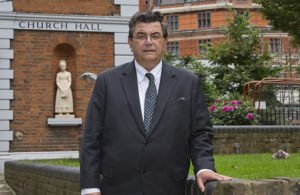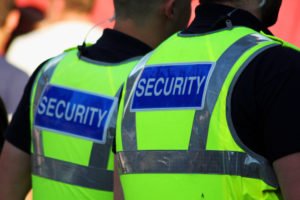IFSEC Global recently sat down with Peter French, CEO of SSR Personnel, to discuss the impact COVID has had on those employed in the security sector. We also discussed the changing face of the industry and skillsets it requires, as well as why employers need to be placing greater importance on mental health.

Peter French, CEO of SSR Personnel
It goes without saying that every industry has felt the impact of COVID-19. Whether it has resulted in a different way of doing business, temporary closures, or adapting to a ‘new normal’, there has been little escape from its effects. Clearly, this is having an impact on jobs – significant losses have affected hospitality, tourism and aviation sectors, to name just a few. But what about security?
Peter French, CEO of SSR Personnel – a specialist recruitment company in the security and risk management sector – is in a better position than most to assess. The business was founded in 1986 in the UK, and now has a strong presence around the world, recruiting for roles in corporate risk resilience and for security technology vendors.
The impact of COVID-19 on security
“Of course, industries such as hospitality and sport have been devastated by the pandemic,” begins Peter. “For security, there’s the inevitable knock-on effect on staffing – suddenly with restaurants and bars operating at limited capacity, and sport taking place without spectators, fewer staff are required to manage crowds and secure premises. Attempts are being made to improve the situation, like drive-in cinemas, but I would suggest this hasn’t made up for the loss of festivals, for example. And then you have to consider how all this may work in the winter with indoor events.”
Despite these concerns, from its vantage point as a specialist recruitment firm, SSR Personnel has noticed a rise in requirements for security roles in other areas. As staff begin to come back to the office, new safety systems are being put in place, ranging from occupancy management to temperature screening. And, as Peter explains, the security team is set to be at the forefront of these operations.
“Many security managers have picked this up under their remit, as they view it as a responsibility they can deal with. It’s not just about the entrance to workplaces, either. There needs to be a team in place who can monitor the technology and work with facilities staff to best organise the processes.
“You also have to think about the top level strategies,” continues Peter. “We’ve seen a rise in requirements for corporate risk resilience roles. Quite often, these are done on a contractual basis, with expert consultants who have been involved in the security industry for a long time able to help companies plan and prepare for the future. Business resilience plans have been thrown into the spotlight. Security professionals are invaluable in these types of roles.”
The changing role of the security professional – communication and technology
Alongside this, the retail environment is once again recruiting for security officers as the high street tentatively reopens. Crucially, employers are looking for individuals who can not only carry out the primary role of a security officer, but also who can support the return of confidence to stores.

“The security officer has a big role to play in bringing confidence to those that decide they want to come out. People aren’t used to queuing to get into stores, so there’s likely to be some frustration at the delay, while there are others who will still be cautious. The front-of-house security officer then has to adapt to both types of scenario. Clear communication will be imperative. And those who are multilingual will be especially sought after – particularly in London and the busier cities.”
“One thing that has changed when speaking to retailers is that petty theft has actually been significantly reduced. Thieves don’t feel safe when they know people are on more alert than usual, and when there may be fewer customers in the store to hide behind.”
One takeaway from this may be that the general public will begin to recognise the importance of a security officer’s work, and highlight skills that they may not have always attributed to the role. It’s an issue the industry is working hard to tackle. The BSIA, Security Institute and Security Commonwealth have recently launched a joint dedicated campaign to reset the public perception of security officers, for instance.
As Peter explains further: “We underestimate that a lot of licenced security officers are multilingual, or that they have skills that go far beyond their face-to-face dealings with the public. I hope it is made clear that this sector has ‘stood up’ across the world as part of the frontline during this pandemic.


